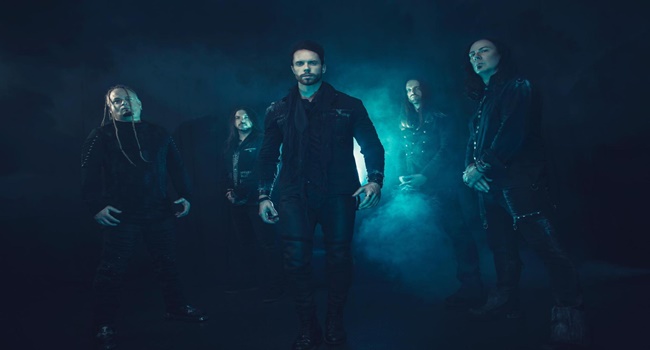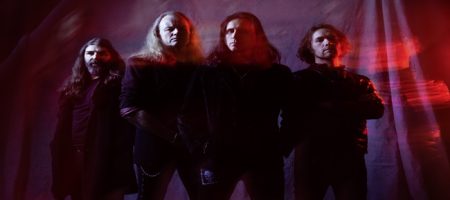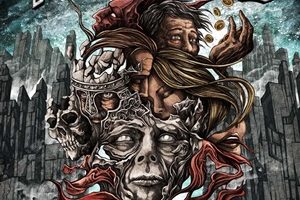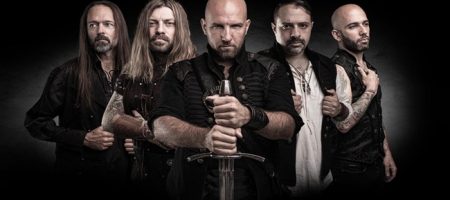Kamelot – Drive the Flag into the Ground
Sunday, 12th March 2023
People appreciate the slow, steady climb into success in most endeavors. Kamelot have been a dominate force in the melodic power/progressive metal genre for decades – first gaining success in Europe and overseas territories, eventually to drive that similar path home stateside. The Awakening as the latest studio record showcases a quintet comfortable with a balance between a lot of the sound that put them on the map while also incorporating more straightforward elements that can create ideal anthems for the future. We spoke with vocalist Tommy Karevik regarding the making of the record, the extra time that the pandemic provided, the personalized, introspective lyrical focus, thoughts on his time with Kamelot and adjusting to expectations, how living in Canada now is similar to his origins in Sweden, and future plans.
Dead Rhetoric: The Awakening is the latest Kamelot studio record – the 13th for the band, and your fourth with the group. Now that you’ve had some time to sit with the final product, how do you assess this set of material and where it sits in the catalog for Kamelot’s discography?
Tommy Karevik: I would say it is probably one of our most diverse albums. I think we made a conscious decision this time to bring back some of the more melodic songs, strong choruses, and harken back to that Celtic sound at times. That was a really strong point in Kamelot’s music back in the days before I joined. We brought it back, but at the same time we have had a lot of shows under our belt – we got a feeling for what works live, and we tried to incorporate those elements in the songs as well. You listen to it as a whole and I think every song is something that could be played live. We wanted to have the Kamelot classic sound and dress it up in a new suit, have the guitars a little more upfront and make sure the music is driving. In a way that someone would experience us live.
Dead Rhetoric: Have you reached a certain comfort level now that you are four albums deep into the band – as far as what you want from your vocals and lyrics?
Karevik: I would say so. Everything takes time. With every album it’s been more and more comfortable and feels like it’s your own. Coming into this thing, you have to do your homework and I really wanted to make sure that I was humble. They had a great legacy and a great front man, make sure I could do this justice and in time bring myself into the mix a lot more. Which I think at this point I’m very comfortable and utilize my strengths as a vocalist as much as I can.
Dead Rhetoric: Did you seek out any specific advice stepping into the shoes of a legend like Roy Khan when you first entered this band?
Karevik: I was lucky. I really didn’t know the extent of how well-renowned Roy was. I wasn’t coming from a place of fandom, I was throwing into metal from pop. I had no background, which basically helped. That being said, you can sense it, listen to his stuff and see that he was an artist, and very good at what he was doing. I didn’t ever contact Roy, it wasn’t that kind of deal – he disappeared. I tried to listen to a lot of the stuff that he did, and I was grasping the overall mood and the way he was doing things to start it off because that was important to not have too much of an abrupt change in style and approach.
I had to really dig deep to listen to the stuff, analyze it. But then also to be able to trust my own musical instincts that was really important in the beginning too. That’s what I’ve been doing for ten years, almost fifteen years in my other band Seventh Wonder.
Dead Rhetoric: Would you say it’s more challenging to start with a blank slate through each successive album to not only please yourselves as composers and musicians but also meet the standards and expectations of the Kamelot following that has been long-running for decades globally?
Karevik: I try to not think about that so much. You are not doing yourself any favors by thinking too much about what the people are going to think. You have to stay true to your heart, your instinct. But I think at this point we have a good idea of what that is. And if we like it, we are expecting people also to like it. That’s what made Kamelot, Kamelot in the first place. We try to stay true to our traditional sound, but explore because we are not the same people we were twenty years ago either. It’s more so you evolve with the music – the core of the music stays the same but you can incorporate these different elements, go a little heavier, go a little more direct at times. But you always have this core thing to fall back on.
Dead Rhetoric: You’ve released two singles/videos so far for “One More Flag in the Ground” and “Opus of the Night”. How do you feel about the response, the visual medium in general, and the difficult process to choose specific tracks to preview what people can expect from the full record?
Karevik: It’s always hard. We are very excited about the response so far. “One More Flag in the Ground” is a song that has everything that should be in a Kamelot song, even if it’s packed into a little more direct format. It’s punchy, but people can say in the song there are elements that are very much Kamelot. You have to do different things to explore aspects of your music to widen your audience. We want to play bigger shows too, and play in front of more people that love the music. We as people, we like those kinds of songs too. We didn’t try to write a song for the radio, it just came down to something that sounded like it could be played on the radio. That was a cool endeavor. The second single is way more traditional Kamelot – a little bit more progressive, a little like a journey in itself, a little longer song, we have Tina on there too. It’s pretty organic, the process of picking those songs.
It’s always hard, you have a full album of what we consider good songs to say like we go with this as the single. It’s never going to make the whole album justice anyway.
Dead Rhetoric: And where did you draw inspiration from for the lyrical content this time? I heard you dug deep into more of your personal experiences through this record…
Karevik: I think… coming out of the touring cycle after Shadow Theory, we were sitting down to start writing and then COVID-19 hit. It gave us time, someone came and tapped on our shoulders to say, ‘it’s okay to take a breath’. We did that. It was a time of introspection for many people. Who am I, who do I want to be when this is over, when the world opens up again? Am I doing the right things? What can I do to make myself better? A lot of introspection, including us within the band. It was a good break for me to have, it’s been so long. It was okay for me to be outside chopping wood. That will you give some inner peace, and you have room to think about what you are actually doing. And I think that’s what happened with the lyrical content on this album.
Dead Rhetoric: Of course, guest contributions always add that extra flavor/color to specific tracks for Kamelot. Discuss the choices this time with Melissa Bonny of Ad Infinitum plus instrumentalists Florian Janoske on violin and Grammy-nominated cellist Tina Guo and what they brought to the table to impact the record that much more?
Karevik: Thomas usually finds the right guest vocalists and guest musicians. He is way more up to date than I am in the genre and the space for a reason. He had his eyes on both Melissa and Tina for a while, it just happened to line up this time. And what they bring, Tina is on two songs, she does a phenomenal job. She has that theatrical approach to her music, that fits really with what we are doing. It’s very theatrical, dark, brooding, and intense. She’s really cool visually too. It was a no brainer. Melissa is an up-and-coming artist. She does harsh vocals as well as clean vocals. We’ve had a person who can do both for a while. She comes with me in the live shows, amongst all the other guest musicians. She’s on the album and does a great job, a beautiful voice. We just had her on tour with us in South America, and she did a phenomenal job. She’s a sweetheart, a really cool person. People like that, it makes touring with easier.
Dead Rhetoric: How would you currently describe your comfort level now within Kamelot being a part of the band for over a decade? And what’s it like working with Thomas Youngblood for this band as a musician and a person, as I’d imagine it’s much different than your work within Seventh Wonder?
Karevik: Yeah, it’s different. All constellations of people within bands, you will get different dynamics. It’s been great, he’s given me a lot of room. Even more on this album, I did more writing of the music this time around. It’s good, and he has no problem with letting other people in, if it’s good. This time around, we couldn’t meet up because of COVID-19, so we sat at home and exchanged ideas through the internet. We had a folder to pick from, and whatever inspired us we worked on. With Thomas, it’s been great from day one. He’s an American, I’m a Swedish person, but it doesn’t matter – in this case we are just people, musicians trying to make a good product. And that’s the main focus. That makes it easier to get along with them. We don’t always think the same, but I think that makes for a better product in the end.
Dead Rhetoric: How do you feel about the cover art this time? Obviously, the band takes a lot of pride into cover art, imagery, and merchandising…
Karevik: I think it’s a fantastic cover. It brings the old style back, but in a new suit again. It’s an epic cover, the art itself inside is also beautiful and full of detail. I have to give credit to Thomas there, he always works closely with the artists. He has that flair, that eye for that style and detail that became a Kamelot trademark. I think everyone that orders the special edition is going to get a beautiful package.
Dead Rhetoric: Doing those South American shows after a long break from the stage, how was the response and how did it feel as a band to be back on stage?
Karevik: It was great. We played a lot of shows. The new songs needed to be polished up a bit. We met up on the 70000 Tons of Metal Cruise, we rehearsed a couple of times so we could get the songs down. We didn’t want things to be a trainwreck, which it wasn’t. As an artist you are always eager to make sure it’s not bad. Everyone did their homework, the crowd reactions were really good. Once the new songs have time to settle, it’s going to be nice to go out on tour and perform these songs.
Dead Rhetoric: How has your life changed now that you are married and living in Canada versus your time in Sweden? Any specific adjustments that you’ve had to make as far as the people, culture, lifestyle?
Karevik: Probably eating out more! (laughs). I love this type of bar culture that is in North America and Canada. It’s a romantic thing for me, when you are on tour even to go to a bar, there’s a nice bartender who is serving you food, talking to you actually. In places like this, people go to meet, even if you are lonely people will go to talk, it has an open feeling. In Europe I feel like it’s a little bit different, bartenders are the rock stars there and you have to fight for their attention. I’m not talking bar like drinking, I’m talking bar as in an area where you sit and eat out, for example lunch or dinner. It’s not uncommon to see people sitting here alone, having a bite to eat and talking. That’s nice, that doesn’t happen in Sweden a lot. Everyone is reserved and in their own space.
The nature here is beautiful here in Canada. It’s kind of like Sweden on steroids. It’s bigger mountains, more lakes, higher trees. The winters are on steroids too, it’s like – 35 sometimes. I love it, it’s great. It’s great to be able to see different things, do different things. If you do the same thing, you know the result is going to be the same.
Dead Rhetoric: What do you think is hard for the average fan to understand, especially when it comes to the behind the scenes or business decisions that have to be made, within Kamelot?
Karevik: Oh… there are so many things. That’s a huge topic. You don’t see as a fan or following someone on social media, the behind the scenes or harsh times, hardships. And maybe that’s good, and what it should be. Sometimes you can see certain comments about certain things that people have no idea really about. They assume, and that’s fine too. It’s what we are dealing with now. If these kinds of people only knew. It’s easy to call someone out, say something bad, negative energy. Especially if you have never tried to release an album yourself, or gone out on tour, or sing, or anything, it’s easy to be critical. At the end of the day, you have no idea what it really is unless you have tried it out for yourself.
Dead Rhetoric: Do you have to just ignore social media and limit your use of it due to this criticism and ignorance with certain people?
Karevik: Definitely. I don’t think it’s a safe place for anyone, I would say. Everybody has gone way too overboard with everything. All you see is positive, all you see is perfect, manicured stuff. It’s not good. A little bit of that – it’s a great tool if you want to market yourself. For me, I don’t post a lot – I post things when I have something to post. I try to spend as little time as I can on it.
Dead Rhetoric: Where do you think you’ve seen the biggest growth or improvement when it comes to live performances during your time in Kamelot? Are there specific differences for your approach/outlook when it comes to small theatres/club venues versus the festival settings?
Karevik: We’ve grown in the North American market a lot. We can see that as being at the same level as Europe now, which is amazing. That wasn’t the case in the beginning. Now we can expect strong shows, a bigger production in North America. And that’s something that’s happened during my time in the band, and it’s really cool. We just came back from South America, and it was crazy. Now it will be interesting to see what Europe is like this time around, after a few years. I think it will be good. We want to break new ground in certain places that we haven’t tried before.
Festivals, usually there is a bigger stage and you get paid more for a festival appearance, you can add more elements to the show which is really expensive to do – pyro for example. But then, the setting is different. You have to play a different setlist, you play the stuff that will get people going rather than the artistic stuff that you will pull out in the longer live shows. The fans are there at the theater shows in a different way, they are your fans. It’s not going to be Kreator’s fans you are playing for. I love both, I like playing outside at a festival in the summer, it’s magical. The small club shows can be very intimate, you have the fans in your hands, you live this night together as one because everyone knows the songs. It’s beautiful in different ways.
Dead Rhetoric: How do you see the state of the world today? If you had the opportunity to give people some thoughts about how to approach life coming out of the pandemic, what are things that you believe they should think about?
Karevik: Make sure you feel good about what you are doing. Learn to say no. That everything that is worth fighting for is going to be a little bit painful. I think those are the things I would take away. This is in the lyrics of songs on the new album. People think that life is supposed to be easy – I think that’s not the case. It’s always going to be tough to be a human being, it’s what we do when it’s tough that defines us. Someone said once that progress equals happiness. I think that’s true. If you are not progressing, you are slowly regressing. You have to do something, push through your fears, work on your weaknesses until they become your strengths, I think.
Dead Rhetoric: What would surprise people to learn about Tommy the person away from your musician duties and abilities?
Karevik: I am pretty open with who I am. I don’t mind being alone. I’m introverted, but I can function in life and in social gatherings, but it takes a lot out of me, including touring. Usually, I will seek solitude a little bit before and after the show to give everything I have during the live show. That transmits to me being more of a private person.
Dead Rhetoric: What’s on the agenda for any activities related to Kamelot or Seventh Wonder going into the next twelve to eighteen months as far as shows, festivals, promotion, etc.?
Karevik: We’ve done all we can for Seventh Wonder for the time being. It will be full force Kamelot going forward. We have a European tour, summer festivals: Sweden Rock in June, a couple of other festivals. Then we will go on a North American tour, hopefully in September. Tokyo, Japan in maybe November. It’s going to be full on – I’ve already been to Europe four times over the last four months. It’s opened up with a bang, I would say. Something that would be cool for us or extreme would be to play Coachella or something like that. Something that is a huge festival but not necessarily just metal bands. I’ve never played Metalcamp in Slovania, that’s a cool setting I would like to play. We will take whatever life throws at me – or us (laughs).




























